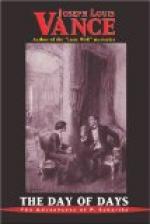“Taxi!” the little man panted vociferously.
The other yawned and stretched. “It can’t be done,” he admitted fairly. “They ain’t no such animal on the premises.”
With a gesture P. Sybarite singled out the nearest car.
“What’s that?” he demanded angrily.
Shading his eyes, the man examined it with growing wonder which presently found expression: “As I live, it’s an autymobeel!”
“Damn your sense of humour!” stormed P. Sybarite. “What’s the matter with that car?”
“As man to man—nothing.”
“Why can’t I have it?”
“Ten dollars an hour—”
“I’ll take it.”
“But you asked for a taxi,” grumbled the man, rising to press a button. Whereupon a bell shrilled somewhere in the dark backwards of the establishment. “Deposit...?” he suggested, turning back.
P. Sybarite disbursed a golden double-eagle; and to the operator who, roused by the bell, presently drifted out of the shadows, gaping and rubbing his eyes, he promised a liberal tip for haste.
In two minutes he was rolling out of the garage, ensconced in the body of a luxurious and high-powered touring machine which he strongly suspected to be somebody’s private car lawlessly farmed out while its owner slept.
The twilight was now stronger, if still dull and as cold as the air it coloured, rendering P. Sybarite grateful for Peter Kenny’s inverness as the car surged spiritedly up the deserted avenue, its disdain for speed regulations ignored by the string of yawning peg-post cops—almost the only human beings in sight.
Town was indeed deep sunk in lethargy at that small hour; the traditional milk-wagon itself seemed to have been caught napping. With one consent residence and shop and sky-scraping hotel blinked apathetically at the flying car; then once more turned and slept. Even the Bizarre had forgotten P. Sybarite—showed at least no sign of recognition as he scurried past.
A curious sense of illusion troubled the little man. The glamour of the night was gone and with it all that had lent semblance of plausibility to his incredible career; daylight forced all back into confused and distorted perspective, like the pageant of some fantastic and disordered dream uncertainly recalled long hours after waking.
As for himself, in his absurd attire and bound upon his ambiguous errand, he was all out of the picture—horribly suggestive of an addled sparrow who had stayed up all night on purpose to cheat some legitimately early bird out of a chimerical first worm....
Self-conscious and ill at ease, he presented himself to the amused inspection of the night force in the office of the Plaza, made his halting enquiry, and received the discounted assurance that Miss Blessington, though a known and valued patron of the house, was not then its guest.
Convinced, as he had been from the moment that the words “two-thirty,” falling from the lips of the Bizarre’s house detective, had made him alive to his terrible oversight, that this would be the outcome at the Plaza, he turned away, sobered, outwitted, and miserably at a loss to guess what next to do.




